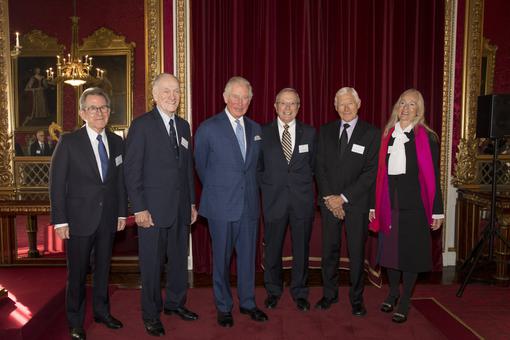HRH The Prince of Wales Honours GPS Inventors at Buckingham Palace

Categories: QEPrize
Today, four US engineers were awarded the 2019 Queen Elizabeth Prize for Engineering (QEPrize) during a ceremony at Buckingham Palace for their work creating the first truly global, satellite-based positioning system, GPS. The QEPrize is the world’s most prestigious engineering accolade, a £1 million prize that celebrates the global benefit of engineering innovation on humanity.
His Royal Highness The Prince of Wales presented the trophy to Dr Bradford Parkinson, Hugo Fruehauf, Richard Schwartz, and Anna Marie Spilker, who accepted the award on behalf of her late husband, Professor James Spilker, Jr.
Dr Bradford Parkinson – often regarded as the ‘father of GPS’ – led the development, design, and testing of the system. Hugo Fruehauf developed a highly accurate, miniaturised atomic clock, a foundational component of the system. Richard Schwartz engineered a satellite hardened to resist intense radiation in space, with a lifespan three times greater than expected. Professor James Spilker, Jr, was the main designer of the GPS civil signal and, with his team at Stanford Telecommunications, built the receiver that processed the first GPS satellite signals.
Lord Browne, Chairman of the Queen Elizabeth Prize for Engineering Foundation, highlighted the critical role of collaboration in engineering, and in groundbreaking innovations such as GPS: “Our laureates’ success was the result of inter-disciplinary collaboration, a drive for excellence, and an ability to turn the fruits of scientific discovery into practical solutions. That is what engineers do.”, he said.

Lord Browne, Richard Schwartz, HRH The Prince of Wales, Dr Bradford Parkinson, Hugo Fruehauf and Anna Marie Spilker
Today, an estimated four billion people around the world use GPS. At just $2 per receiver, GPS provides an accessible service and a powerful tool that people can integrate with their applications. Simple smartphone apps can track disease outbreaks, self-driving tractors can optimise crop harvests, and sports teams can improve team performance. New applications for GPS continue to revolutionise entire industries, and its annual economic value has been estimated to be $80 billion for the USA alone.
GPS combines a constellation of at least 24 orbiting satellites with ground stations and receiving devices. Each satellite broadcasts a radio signal containing its location and the time from an extremely accurate onboard atomic clock. GPS receivers need signals from at least four satellites to determine their position; they measure the time delay in each signal to calculate the distance to each satellite, then use that information to pinpoint the receiver’s location on earth.
This year’s QEPrize trophy was designed by 17-year-old Jack Jiang from Hong Kong. Jack’s elegant trophy design won the 2019 Create the Trophy competition, an international competition that invites those aged between 14-24 around the world to submit innovative trophy designs for the world’s leading engineers. The 2019 competition saw a record number of entries, with submissions stemming from over 50 countries worldwide.



